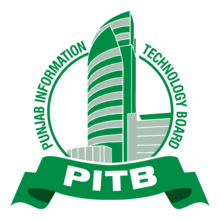Punjab Information Technology Board
The Punjab Information Technology Board (reporting name: PITB) was established in 1999 by the Government of the Punjab as an autonomous body under the Department of Industries, operating under the administration of Information Technology Department from 2001-2011. The key focus of the department was to monitor global opportunities, cater to the growing need of IT, developing the policy initiatives, planning and implementation of initiatives to increase the competitiveness of the IT industry in the Punjab province. The Information Technology department was dissolved in 2011, and PITB was attached under the Planning & Development Department Punjab.

PITB acts as the foundation of innovation economy in Punjab which aims at modernization of governance techniques by implementation of transparency induced governance techniques. Moreover, PITB focuses on improving the digital literacy of the citizen of the province. In addition to the above-mentioned role, the organization is dedicated to provide effective and efficient technological services and build IT infrastructure for governmental agencies, national and international businesses.
PITB is considered the leader of technological innovation in Punjab, Pakistan which has developed, implemented and successfully impacted the health, education, law & order, agriculture, transport sector of the province. The organization is reviving the entrepreneurial culture in Pakistan by building capacity of students as well as professionals from private and public sector by providing them training and business incubation facility (About Us: PITB, 2019).[1]
Budget[2]
Non Development Budget |
Development Budget | |||||
| Fiscal Year | Allocated
(PKR) |
Modified
(PKR) |
Expenditure
(PKR) |
Allocated
(PKR) |
Modified
(PKR) |
Expenditure
(PKR) |
| 2019 - 2020 | 558,751,000 | - | - | 1,939,168,000 | - | - |
| 2018 - 2019 | 947,985,000 | 788,579,101 | 776,927,159 | 1,093,494,000 | 1,365,584,236 | 1,291,816,507 |
| 2017 - 2018 | 694,903,000 | 890,252,564 | 793,622,109 | 2,573,325,000 | 2,701,464,290 | 1,663,110,016 |
| 2016 - 2017 | 399,656,000 | 850,161,000 | 472,036,000 | 1,790,343,000 | 1,661,488,000 | 1,277,161,000 |
| 2015 - 2016 | 308,842,000 | 901,655,000 | 591,370,629 | 1,093,631,000 | 1,125,225,000 | 938,010,000 |
| 2014 - 2015 | 173,574,000 | 257,854,000 | 240,638,902 | 1,141,045,000 | 1,300,819,000 | 1,093,349,295 |
| 2013 - 2014 | 139, 478, 000 | 228, 707, 000 | 217, 598, 697 | 932, 968, 000 | - | 611, 708, 632 |
| 2012 - 2013 | 125,673,500 | 169,921,700 | 166,366,497 | 1,462,848,000 | 1,489,111,000 | 1,124,677,841 |
| 2011 - 2012 | 96,540,000 | 166,990,956 | 157,863,009 | 750,869,000 | 594,012,000 | 544,054,324 |
References
- "About Us | PITB". www.pitb.gov.pk. Retrieved 2019-12-31.
- "Budget | PITB". www.pitb.gov.pk. Retrieved 2019-12-31.